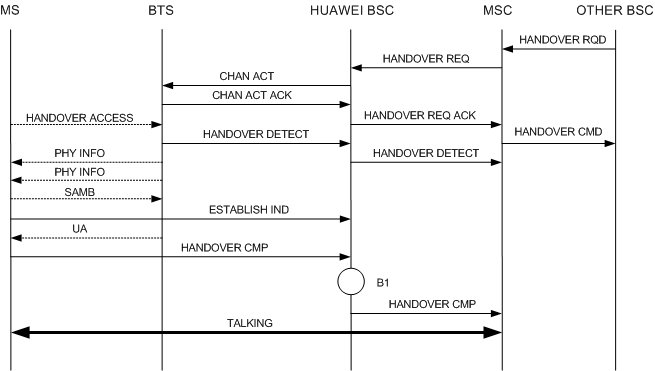Measurement Counter
M3120a:CELL_CALL_DROPS_BTSLOOP_FAIL_APPLY_TRSL_FAIL_TCHF
Description
After the call is put through or the incoming BSC handover for the speech service is complete, the BSC selects the BSS local switch policy, determines the local switch start conditions, and performs local switch call detection in the local loopback procedure. If all the local switch conditions are met, the BTS local loopback procedure is started. Within the BSC, the call processing module initiating loopback start at one end sends a loopback request message to the call processing module at the peer end. At the call processing module at the peer end, the BSC requests Abis resources, reconnects the transmission channel between the Ater interface and the Abis interface, and requests TC resources. If the request for Abis resources, the reconnection, or the request for TC resources fails, the BSC physical layer returns a loopback acknowledgement message to the call processing module with the cause value of territorial resource request failure. Then, the BSC regards it as a call drop and releases the call directly. The BTS loopback start fails.
This measurement provides the number of call drops on TCHF due to BTS loopback start failure (territorial resource request failure).
Unit
Integer number or integer.
Measurement Point
After the BSC receives the CONNECT ACK message from the MSC in the MS terminated call procedure, as shown in Figure 1(A1), or after the BSC receives the HANDOVER CMP message from the MS in the incoming BSC handover procedure for the speech service, as shown in Figure 2 (B1), the BSC selects the BSS local switch policy, determines the local switch start conditions, and performs local switch call detection in the local loopback procedure. If all the local switch conditions are met, the BTS local loopback procedure is started. Within the BSC, the call processing module initiating loopback start at one end sends a loopback request message to the call processing module at the peer end. At the call processing module at the peer end, the BSC requests Abis resources, reconnects the transmission channel between the Ater interface and the Abis interface, and requests TC resources. If the request for Abis resources, the reconnection, or the request for TC resources fails, the BSC physical layer returns a loopback acknowledgement message to the call processing module at the peer end with the cause value of territorial resource request failure. Then, the BSC regards it as a call drop and releases the call directly. If the channel that carries the call during the call drop is a TCHF, this counter is measured.
Formula
This is an original counter without involving any formula.

